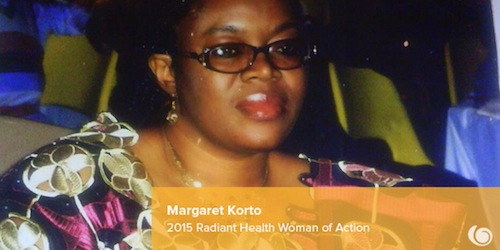Margaret Korto Calls For A Seat At The Table To Meet African Health Problems With African Solutions
The Radiant Health Women of Action is our list of inspiring women…

The Radiant Health Women of Action is our list of inspiring women taking action to improve the health and well-being of African communities, whether on the continent or in diaspora.
African problems call for African solutions, and Margaret Korto has devoted her life to bringing those solutions to light.
Oftentimes, solutions to African health issues are addressed by non-Africans. Margaret Korto, a senior program analyst with the Office of Minority Health, is seeking to change this. Korto hosts the U.S. Conference on African Immigrant Health (USCAIH), an annual gathering for African professionals to come together, network, discuss wellness needs and present findings.
“If you are not at the table, then you are on the plate,” asserts Korto. “I believe we Africans are well educated. We know our issues as lived experiences and are more knowledgeable than others to address them.”
Korto began gathering African minds on a smaller scale in 2008, hosting the National African HIV/AIDS Initiative (NAHI) for African health professionals from five states. “After gathering all the data, we realized a lot of work was being done by African professionals without a platform to address them collectively,” Korto explains.
With support and funding from the Office of Minority Health Resource Center, the first USCAIH was held in 2010 in Atlanta, Georgia, with 300 participants. At each yearly gathering, African health professionals discuss how to address health disparities within African communities and learn how their peers are tackling similar problems.
“My hope is if one person gets their yearly checkup or goes to see a doctor because of something I or any of the numerous health professionals in our community did or said, then I have done my part,” Korto says.
Despite the success of the USCAIH, Korto acknowledges that there is still a lot of work to be done to address long-held beliefs and routines that are damaging to health in the African community.
“It saddens my heart to say we still have more attendance at funerals than health education forums,” says Korto. “Most Africans have insurance, yet I am often invited to help a brother or sister African who has end-stage disease because they chose to overwork instead of making time for checkups, or simply didn’t feel sick.”
Korto’s work has had a positive impact on her personal outlook as well. In addition to “becoming more African,” according to her children, she has also addressed the frustration she once felt about what wasn’t being done in her community. “I realized that I am part of the community and can start doing something. The person we are waiting for to help us is US.”
USCAIH 2016 will be held September 15-18 in New York City. Korto hopes to have more African professionals and those working with African communities around the world attend and showcase their work and findings.
[MORE]: See All the 2015 Radiant Health Women of Action

